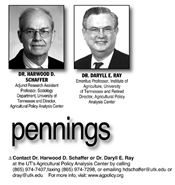|
Weather-Based Price Premiums Will Be Helpful But Of Limited Help

Following up on our column, “2019 is one of THOSE years” (https://tinyurl.com/yyakav5c), we want to examine some of the financial issues facing farmers in a year with widespread flooding, fields that won’t dry out, and prevented planting, all taking place in the midst of a trade war that has put downward pressure on the export price of US commodities.
This year is unlike 2012 when farmers were experiencing record high prices for their corn and soybeans, with the drought only driving corn prices higher. Even farmers who did not take the harvest time insurance pricing option, were still able to receive a decent price for their insurance covered crop losses. As a result, nearly every farmer survived the adverse weather with few negative long-term financial consequences.
This time is different. In 2019, we are coming off five years of declining prices and net farm income. Many farmers have little reserve with which to make it through the current weather-caused crisis. As a result, the impact of the flooding may be significantly different from one farmer to the next. It will depend on the extent of flooding and prevented planting, whether the harvest time price option was chosen, and the financial situation of the farmer going into the 2019 season. The greater the flexibility farmers are given on the use of their prevented planting acres, the better they will weather this storm.
Those who have a crop to sell or took the harvest time pricing option will certainly benefit from a weather premium. In the 1946-1995 period the weather price premium averaged $0.59 per bushel of corn, relative to the price expected for a given stocks-to-use ratio. In 2012, under pressure from the need for corn to be used in ethanol production, the price premium for corn was a whopping $2.49 per bushel. At this point, it seems certain that there will be a price premium, but we will have to wait and see how large it is. Worldwide production of and demand for feed grains will have an impact on the size of the price premium.
In addition, we are in the midst of a trade war with China in which farmers have taken it on the chin while other sectors have been able to pass some of the added costs on to the eventual consumer. The administration made one round of Market Facilitation Program payments (MFP) in 2018 and “has authorized USDA to provide up to $16 billion in programs [$14.5 of which is for the MFP], which is in line with the estimated impacts of unjustified retaliatory tariffs on U.S. agricultural goods and other trade disruptions.”
On June 10, Secretary Perdue said, “In the coming weeks, USDA will provide information on the Market Facilitation Program payment rates and details of the various components of the disaster relief legislation. USDA is not legally authorized to make Market Facilitation Program payments to producers for acreage that is not planted. However, we are exploring legal flexibilities to provide a minimal per acre market facilitation payment to folks who filed prevent plant and chose to plant an MFP-eligible cover crop, with the potential to be harvested and for subsequent use of those cover crops for forage.” Further details about payments can be found at https://tinyurl.com/y2p83ryn.
Though the rationale for farm policies since 1996 was to reduce the influence of government policies on farm income and allow farmers to receive their income from the marketplace, the dependence on insurance premium subsidies and government payments has increased. In 2013, combining direct government payments and insurance premium subsidies, government payments were 16.7 percent of 2013 net farm income. In 2018 these payments (including the MFP) were 32.3 percent of net farm income. ∆
DR. HARWOOD D. SCHAFFER: Adjunct Research Assistant Professor, Sociology Department, University of Tennessee and Director, Agricultural Policy Analysis Center
DR. DARYLL E. RAY: Emeritus Professor, Institute of Agriculture, University of Tennessee and Retired Director, Agricultural Policy Analysis Center
|
|